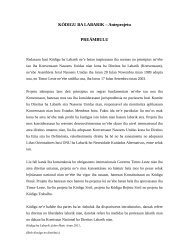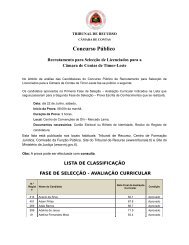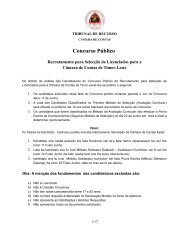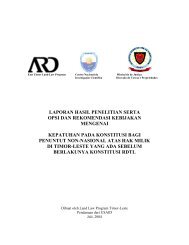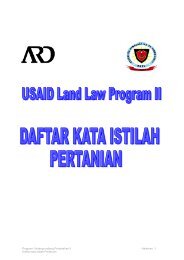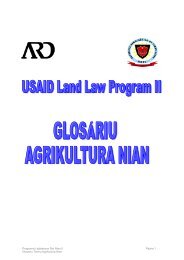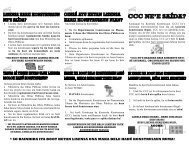English
English
English
Create successful ePaper yourself
Turn your PDF publications into a flip-book with our unique Google optimized e-Paper software.
6. PROPOSED PROCEDURAL<br />
FRAMEWORK FOR LAND<br />
EXPROPRIATION IN<br />
TIMOR-LESTE<br />
1. A national government agency should be responsible for handling any kind of expropriation-related<br />
issues. The Directorate of Land and Property (in coordination with other related agencies) can handle<br />
these actions.<br />
2. Any expropriation should serve a public purpose and, while doing so, should follow the legal and<br />
other provisions established in international and other comparative constitutional laws. The<br />
government should arrange to provide for a fair amount of compensation in expropriation. When<br />
expropriating public unutilized and underutilized land, there is no need to provide compensation<br />
amounts. In such cases, however, government should make clear that the expropriated land will be<br />
utilized for public purposes or it can be redistributed to nationals with the goal of putting that land<br />
into the best alternative uses.<br />
3. Regarding private property held by nationals, the framework should provide for fair compensation.<br />
The amount of compensation may vary with the nature of compensation. If the government<br />
expropriates whole property, full compensation should be provided and the compensation amount<br />
should be based on current use of property and its current market value. However, the compensation<br />
amount should reflect the history of acquisition and use of property. Sometimes the purpose of<br />
expropriation also will affect the amount of compensation. In a case of a partial expropriation, or<br />
where the expropriation is a very small portion of property, the government may not be liable to<br />
provide any amount of compensation.<br />
4. If individuals whose property is being expropriated do not agree with the government decision to<br />
expropriate, however, the government should establish legal and administrative provision ensuring<br />
that the opponent can register his/her disagreement and negotiate the final agreement. If the property<br />
owner does not agree with either the amount, or the proposed time and manner of payment of<br />
compensation, he or she should have the opportunity to file a complaint with the related authority and<br />
should attempt to reach an agreement with regard to compensation.<br />
5. Government can provide the compensation amount in cash or alternately, it can provide an equivalent<br />
amount of the same kind of land in another place. As the Timor-Leste government in present<br />
circumstances is not in a position to provide cash compensation (expropriation of private property),<br />
land exchange could be a better alternative. It can provide its unutilized public lands in exchange for<br />
private property expropriated for different kinds of public purposes.<br />
These suggestions are not exhaustive, and detailed guidelines and policies for expropriation considering<br />
every aspect should be prepared. An immediate need for Timor-Leste is to identify the property which<br />
should be expropriated, followed by formulation of a detailed expropriation law informed by other<br />
international law and country cases. Finally, it should formulate a detailed procedural framework for<br />
expropriation.<br />
NON-CUSTOMARY PRIMARY INDUSTRY LAND SURVEY 11



